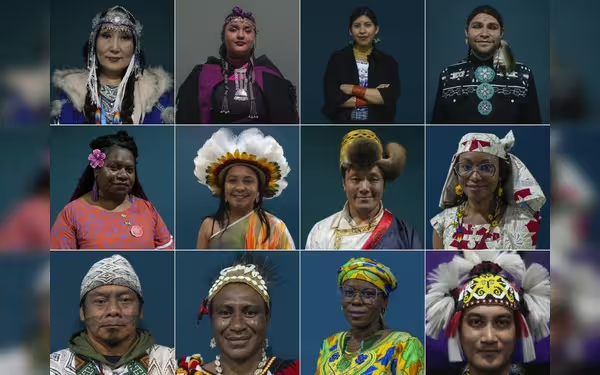Thursday, November 21, 2024 10:00 AM
Indigenous Voices at COP29: Climate Change Impact and Solutions
- Indigenous communities face severe climate change impacts.
- Urgent need for clean water and environmental protection.
- Traditional knowledge offers solutions for sustainable living.
 Image Credits: arabnewspk
Image Credits: arabnewspkIndigenous peoples at COP29 raise alarm on climate change impacts and propose sustainable solutions for a better future.
At the annual UN climate talks, currently taking place in Azerbaijan, Indigenous peoples from around the world are raising their voices to highlight the severe impacts of climate change on their communities. These individuals, who have lived in harmony with nature for thousands of years, are now facing unprecedented challenges due to rising sea levels, extreme weather, and environmental degradation. Their stories are not just about suffering; they also bring forth solutions that can help combat climate change.
Indigenous communities are often the first to feel the effects of climate change. For instance, Saina Ekaterina Savvinova, a 53-year-old from the Yakut community in Russia, reminisces about her childhood filled with snow, stating, "When I was a child, we had a lot of snow. We played in it. We made labyrinths with it. Now we don’t have much snow." This reflects a significant change in climate patterns that directly affects their way of life.
In Chile, Antumalen Ayelen Antillanca Urrutia, a young Mapuche, expresses her concern over the contamination of Ranco Lake, saying, "As a young Mapuche, I denounce the contamination of my home of Ranco Lake in southern Chile. I live on the third largest lake, on an island in the middle of it, and we do not have drinking water." This highlights the urgent need for clean water and environmental protection in Indigenous territories.
Similarly, Sydney Males from Ecuador emphasizes the deep connection his community has with nature, stating, "We have a connection, like an energy, with the lakes, with the water in general. We have a connection with fire, we have a connection with the air and other things that you in the Occident don’t have a connection with. So, we have solutions for climate change." This connection is vital for developing sustainable practices that can mitigate climate impacts.
In the United States, Big Wind Carpenter from the Northern Arapaho community shares the harsh reality of living in a drought-stricken area, saying, "We have been in a drought since I was born. We have been in extreme drought the last 30 years and completely surrounded by wildfires." This statement underscores the dire situation many Indigenous communities face as they struggle with water scarcity and wildfires.
Flora Vano from Vanuatu speaks about the rising sea levels threatening her community, stating, "Sea level rise is eating us up. It threatens our food security, contaminates our water source, infrastructure is destroyed and the increase in gender-based violence goes sky high." This alarming situation calls for immediate action to protect vulnerable communities.
In Brazil, Puyr dos Santos Tembé highlights the impact of deforestation, saying, "Think about the Amazon. You have trees and rivers, and then you see the rivers, which are the mode of transport for many people, drying up." This emphasizes the interconnectedness of ecosystems and the urgent need for conservation efforts.
From Nepal, Mingma Chhiri shares a positive message about conservation, stating, "As ethnic people in the area, we don’t destroy any natural beauty. We don’t cut trees. We plant them." This reflects the proactive approach many Indigenous communities take in preserving their environment.
Hindou Oumarou Ibrahim from Chad describes the devastating floods affecting her community, saying, "Right now we are experiencing the biggest floods we have ever had. Two million people have been displaced and thousands are dead." This tragic situation highlights the urgent need for global attention and support.
In Brazil, Ninawa Inu Pereira Nunes emphasizes the importance of raising awareness about deforestation, stating, "The main work we do is to raise awareness among people to stop deforestation. But we are also restoring degraded areas by planting trees." This proactive approach showcases the resilience and determination of Indigenous peoples in combating climate change.
Marynne Rimbao from Papua New Guinea discusses the impact of mining on her community, saying, "My place is located in one of the remotest places in Papua New Guinea, where there are mining activities. Especially when mining activities are involved, my area is being impacted by climate change when it comes to the environment — the land, the water, the resources, the food and forests — that sustains our livelihood." This highlights the need for sustainable practices in resource extraction.
Finally, Didja Tchari Djibrillah from Chad shares how her community contributes to combating climate change, stating, "The community (of pastoralists) contributes to combatting the effects of climate change. When moving from one place to another, we leave cow dung that allows the soil to be fertilized and the ecosystem to regenerate." This illustrates the traditional knowledge and practices that can aid in environmental restoration.
As the world grapples with the realities of climate change, the voices of Indigenous peoples are more important than ever. Their experiences and solutions offer valuable insights into sustainable living and environmental stewardship. It is crucial for global leaders to listen to these voices and incorporate their wisdom into climate action strategies. By doing so, we can work towards a more sustainable and equitable future for all.













